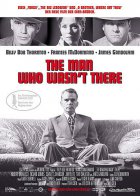
The Man Who Wasn't There
ED (V.O.)
Yeah, I worked in a barbershop. But
I never considered myself a barber...
We track back from a barber's pole.
ED (V.O.)
...I stumbled into it--well, married
into it more precisely...
We track back from a shopkeeper's bell triggered by an opening
door. The pull back and tilt down show the top of the head
of a customer entering in slow motion.
ED (V.O.)
...I wasn't my establishment. Like
the fella says, I only work here...
We track along a shelf backed by a mirror and holding pomade,
aftershave, hair tonic, a whisk brush.
ED (V.O.)
...The dump was 200 feet square,
with five chairs, or stations as we
call 'em, even though there were
only two of us working...
We track in on a big man in a barber's smock scissoring across
a lock of hair that he pulls taut between two fingers of one
hand. In slow motion, he laughs and chats.
ED (V.O.)
...Frank Raffo, my brother-in-law,
was the principal barber. And man,
could he talk...
Another man in a barber's smock is running electric clippers
across a child's head. A cigarette between his lips.
ED (V.O.)
...Now maybe if you're eleven or
twelve years old, Frank's got an
interesting point of view, but
sometimes it got on my nerves. Not
that I'd complain, mind you. Like I
said, he was the principal barber.
Frank's father August--they called
him Guzzi--had worked the heads up
in Santa Rosa for thirty-five years
until his ticker stopped in the middle
of a Junior Flat Top. He left the
shop to Frankie free and clear. And
that seemed to satisfy all of Frank's
ambitions:
cutting the hair andchewing the fat. Me, I don't talk
much...
He plucks the cigarette from his mouth and taps its ash into
a tray.
ED (V.O.)
...I just cut the hair...
The barbershop is empty of customers. Late sun slants in
through the front window. The two barbers--the narrator and
his brother-in-law--sit in two of the barber chairs, idly
reading magazines.
FRANK:
Says here that the Russians exploded
n A-bomb and there's not a damn thing
we can do about it.
ED:
Uh-huh.
FRANK:
How d'ya like them apples?
Beat.
FRANK:
...Ed?
ED:
Huh?
FRANK:
Russians exploded an A-bomb.
ED:
Yeah.
FRANK:
(shaking his head)
Jesus...
ED (V.O.)
Now, being a barber is a lot like
being a barman or a soda-jerk; there's
not much to it once you've learned
the basic moves. For the kids there's
the Butch, or the Heinie...
We cut to examples of the haircuts as they are ticked off:
ED (V.O.)
...the Flat Top, the Ivy, the Crew,
the Vanguard, the Junior Contour
and, occasionally, the Executive
Contour. Adults get variations on
the same, along with the Duck Butt,
the Timberline...
Ed trims the fringe around a balding head.
ED (V.O.)
...and something we call the Alpine
Rope Toss.
He snips one long lonely strand of hair and carefully drapes
it across a bald pate.
ED (V.O.)
...I lived in a little bungalow on
Napa Street. The place was OK, I
guess; it had an electric ice box,
gas hearth, and a garbage grinder
build into the sink. You might say I
had it made.
We float slowly toward a white bungalow on a quiet street as
a black coupe pulls into the driveway.
ED (V.O.)
...Oh yeah. There was one other
thing...
We track in through a bedroom door to discover a woman putting
on a girdle.
ED (V.O.)
...Doris kept the books at
Nirdlinger's, a small department
store on Main Street. Unlike me,
Doris liked the work, accounting;
she liked knowing where everything
stood. And she got a ten per cent
employee discount on whatever she
wanted--nylon stockings...
Close on her legs as she rolls up a stocking and clips it to
the garter.
ED (V.O.)
...make-up, and perfume...
Close on an atomiser misting her bosom with Jungle Gardenia
by Tuvache.
ED (V.O.)
...She wore a lot of perfume.
Doris in a flouncy dress is setting coasters on a coffee
table.
ED (V.O.)
...Doris's boss, Big Dave Brewster,
was married to Ann Nirdlinger, the
department store heiress. Tonight
they were coming over for dinner--as
Doris said, we were 'entertaining'...
Translation
Translate and read this script in other languages:
Select another language:
- - Select -
- 简体中文 (Chinese - Simplified)
- 繁體中文 (Chinese - Traditional)
- Español (Spanish)
- Esperanto (Esperanto)
- 日本語 (Japanese)
- Português (Portuguese)
- Deutsch (German)
- العربية (Arabic)
- Français (French)
- Русский (Russian)
- ಕನ್ನಡ (Kannada)
- 한국어 (Korean)
- עברית (Hebrew)
- Gaeilge (Irish)
- Українська (Ukrainian)
- اردو (Urdu)
- Magyar (Hungarian)
- मानक हिन्दी (Hindi)
- Indonesia (Indonesian)
- Italiano (Italian)
- தமிழ் (Tamil)
- Türkçe (Turkish)
- తెలుగు (Telugu)
- ภาษาไทย (Thai)
- Tiếng Việt (Vietnamese)
- Čeština (Czech)
- Polski (Polish)
- Bahasa Indonesia (Indonesian)
- Românește (Romanian)
- Nederlands (Dutch)
- Ελληνικά (Greek)
- Latinum (Latin)
- Svenska (Swedish)
- Dansk (Danish)
- Suomi (Finnish)
- فارسی (Persian)
- ייִדיש (Yiddish)
- հայերեն (Armenian)
- Norsk (Norwegian)
- English (English)
Citation
Use the citation below to add this screenplay to your bibliography:
Style:MLAChicagoAPA
"The Man Who Wasn't There" Scripts.com. STANDS4 LLC, 2025. Web. 21 Feb. 2025. <https://www.scripts.com/script/the_man_who_wasn't_there_983>.







Discuss this script with the community:
Report Comment
We're doing our best to make sure our content is useful, accurate and safe.
If by any chance you spot an inappropriate comment while navigating through our website please use this form to let us know, and we'll take care of it shortly.
Attachment
You need to be logged in to favorite.
Log In